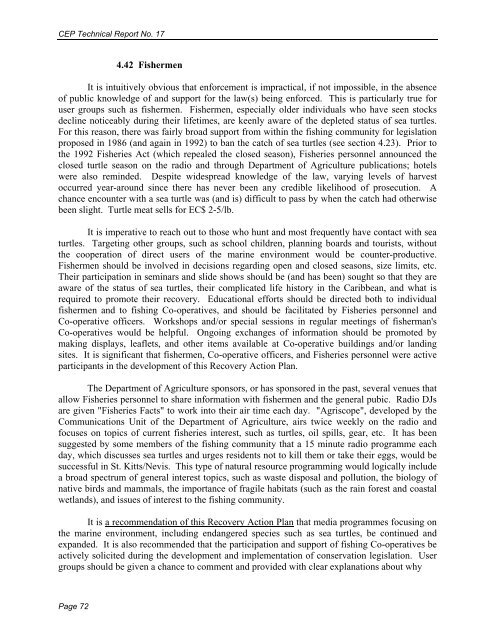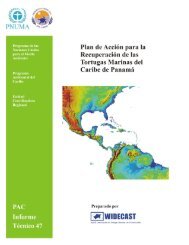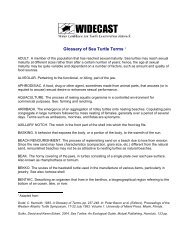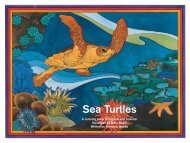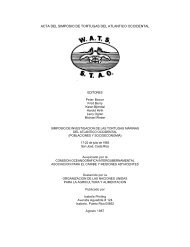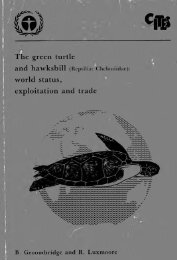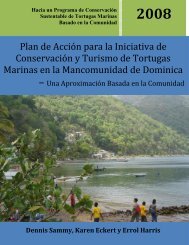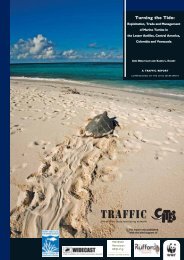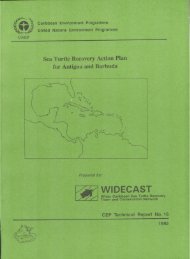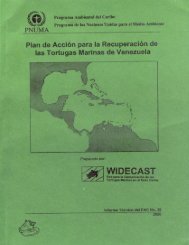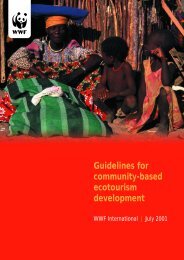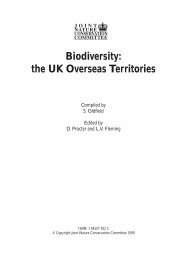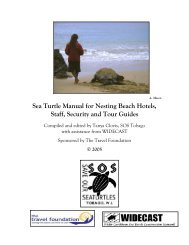Sea Turtle Recovery Action Plan for St. Kitts and Nevis - WIDECAST
Sea Turtle Recovery Action Plan for St. Kitts and Nevis - WIDECAST
Sea Turtle Recovery Action Plan for St. Kitts and Nevis - WIDECAST
You also want an ePaper? Increase the reach of your titles
YUMPU automatically turns print PDFs into web optimized ePapers that Google loves.
CEP Technical Report No. 17<br />
4.42 Fishermen<br />
It is intuitively obvious that en<strong>for</strong>cement is impractical, if not impossible, in the absence<br />
of public knowledge of <strong>and</strong> support <strong>for</strong> the law(s) being en<strong>for</strong>ced. This is particularly true <strong>for</strong><br />
user groups such as fishermen. Fishermen, especially older individuals who have seen stocks<br />
decline noticeably during their lifetimes, are keenly aware of the depleted status of sea turtles.<br />
For this reason, there was fairly broad support from within the fishing community <strong>for</strong> legislation<br />
proposed in 1986 (<strong>and</strong> again in 1992) to ban the catch of sea turtles (see section 4.23). Prior to<br />
the 1992 Fisheries Act (which repealed the closed season), Fisheries personnel announced the<br />
closed turtle season on the radio <strong>and</strong> through Department of Agriculture publications; hotels<br />
were also reminded. Despite widespread knowledge of the law, varying levels of harvest<br />
occurred year-around since there has never been any credible likelihood of prosecution. A<br />
chance encounter with a sea turtle was (<strong>and</strong> is) difficult to pass by when the catch had otherwise<br />
been slight. <strong>Turtle</strong> meat sells <strong>for</strong> EC$ 2-5/lb.<br />
It is imperative to reach out to those who hunt <strong>and</strong> most frequently have contact with sea<br />
turtles. Targeting other groups, such as school children, planning boards <strong>and</strong> tourists, without<br />
the cooperation of direct users of the marine environment would be counter-productive.<br />
Fishermen should be involved in decisions regarding open <strong>and</strong> closed seasons, size limits, etc.<br />
Their participation in seminars <strong>and</strong> slide shows should be (<strong>and</strong> has been) sought so that they are<br />
aware of the status of sea turtles, their complicated life history in the Caribbean, <strong>and</strong> what is<br />
required to promote their recovery. Educational ef<strong>for</strong>ts should be directed both to individual<br />
fishermen <strong>and</strong> to fishing Co-operatives, <strong>and</strong> should be facilitated by Fisheries personnel <strong>and</strong><br />
Co-operative officers. Workshops <strong>and</strong>/or special sessions in regular meetings of fisherman's<br />
Co-operatives would be helpful. Ongoing exchanges of in<strong>for</strong>mation should be promoted by<br />
making displays, leaflets, <strong>and</strong> other items available at Co-operative buildings <strong>and</strong>/or l<strong>and</strong>ing<br />
sites. It is significant that fishermen, Co-operative officers, <strong>and</strong> Fisheries personnel were active<br />
participants in the development of this <strong>Recovery</strong> <strong>Action</strong> <strong>Plan</strong>.<br />
The Department of Agriculture sponsors, or has sponsored in the past, several venues that<br />
allow Fisheries personnel to share in<strong>for</strong>mation with fishermen <strong>and</strong> the general pubic. Radio DJs<br />
are given "Fisheries Facts" to work into their air time each day. "Agriscope", developed by the<br />
Communications Unit of the Department of Agriculture, airs twice weekly on the radio <strong>and</strong><br />
focuses on topics of current fisheries interest, such as turtles, oil spills, gear, etc. It has been<br />
suggested by some members of the fishing community that a 15 minute radio programme each<br />
day, which discusses sea turtles <strong>and</strong> urges residents not to kill them or take their eggs, would be<br />
successful in <strong>St</strong>. <strong>Kitts</strong>/<strong>Nevis</strong>. This type of natural resource programming would logically include<br />
a broad spectrum of general interest topics, such as waste disposal <strong>and</strong> pollution, the biology of<br />
native birds <strong>and</strong> mammals, the importance of fragile habitats (such as the rain <strong>for</strong>est <strong>and</strong> coastal<br />
wetl<strong>and</strong>s), <strong>and</strong> issues of interest to the fishing community.<br />
It is a recommendation of this <strong>Recovery</strong> <strong>Action</strong> <strong>Plan</strong> that media programmes focusing on<br />
the marine environment, including endangered species such as sea turtles, be continued <strong>and</strong><br />
exp<strong>and</strong>ed. It is also recommended that the participation <strong>and</strong> support of fishing Co-operatives be<br />
actively solicited during the development <strong>and</strong> implementation of conservation legislation. User<br />
groups should be given a chance to comment <strong>and</strong> provided with clear explanations about why<br />
Page 72


